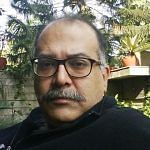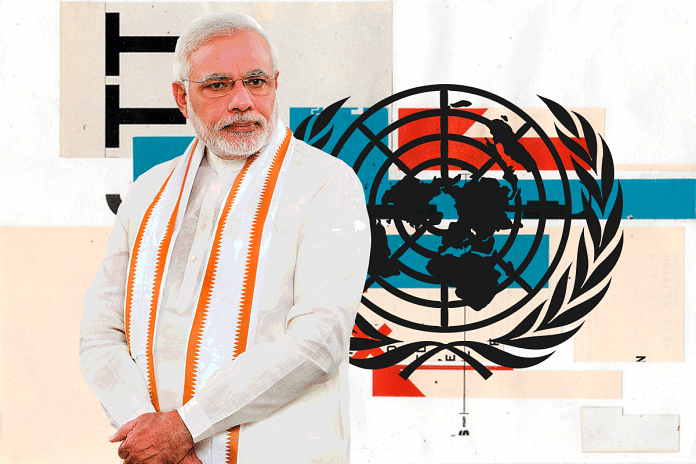After having raised the issue of human rights violations in Kashmir and Thoothukudi, two United Nations experts have now written to India to expedite the investigation into the alleged extra-judicial killings in Manipur.
This is the third time in the last few months when the UNHRC has set its sights on India.
ThePrint asks: String of UN red flags about human rights violations – Is India’s global diplomatic clout fading?
We should ignore such reports as a functioning democracy
 Kanwal Sibal
Kanwal Sibal
Former Indian foreign secretary
Not too much importance should be given to UNHRC reports as the entire subject of human rights is highly political. That countries, which have abysmal human rights record, get elected to it and even assume its chairmanship has affected the credibility of the organisation.
The selective targeting of countries over human rights reinforces the perception that the organisation has double standards when it comes to addressing the issue globally.
Often weak countries or those that have run afoul of the West face the heat from the commission. The powerful countries escape strictures, and even when they do not, they can ignore these reports as mere pin pricks because they control the larger agenda and otherwise wield enough soft power to negate any adverse findings by the commission.
The situation in Manipur has been on the agenda of the Geneva-based organisation for many years. The Special Rapporteur on extrajudicial, summary or arbitrary executions had in fact officially visited India from 19 to 30 March 2012. Its report had expressed concern about extra-judicial killings in India and had proposed a series of legal reforms and policy measures to address the issue.
Two UN rights experts have now urged Indian authorities to complete investigations into such killings in Manipur, after “officials failed to meet a deadline set by the Supreme Court” for inquiries into the cases. It recalled that civil society groups in 2012 submitted more than 1,500 cases of alleged extrajudicial killings in Manipur to the Supreme Court.
It has castigated such delay as “deliberate, undue and unreasonable” and has condemned it. The strong language used is objectionable and uncalled for. Whether the Supreme Court’s three deadlines have been met or not is the Supreme Court’s responsibility, and the language used by two uneducated experts sitting in Geneva with a limited brief casts a broader slur on India’s judiciary and its democracy. We should ignore such reports as a functioning democracy.
A mature response will be to accept human rights failure
 Meenakshi Ganguly
Meenakshi Ganguly
South-Asia Director, Human Rights Watch
It is surprising that so many commentators are describing the recent UN interventions a ‘diplomatic failure.’ Why blame diplomats? Or the United Nations? Or worse, victim families and human rights defenders? No one seems to be actually denying that the abuses have occurred. How would they? Then perhaps the better response is to make a public commitment to accountability, take immediate steps towards justice, and engage in reforms that will ensure protection of rights.
However, Indian leaders also need to accept that there is a reason for increased scrutiny. Communal hate-filled rhetoric against religious minorities and Dalits, an open display of prejudice in administration, tacit support to vigilante violence, praise for abusive actions by soldiers, increasing cases of sexual violence – these are all cause for concern. Democracy, apart from free and fair elections, is also about upholding rights, creating space for disagreement and debate.
For years, at the UN and on other international platforms, Indian leaders have pointed to a tradition of corrective civil society, an independent media and a strong judiciary. But sadly, we are now witnessing change. Media is under pressure whether through insidious demands that criticism be buried, or by threats and litigation, and even by physical attacks, including killings.
Senior judges have called for a halt to politicisation of the judiciary. Among the ugliest sights is the one where lawyers display their bias by championing for the accused whose ideology they back, or where they block and attack defence teams of those they deem guilty even before a court can. Activists are routinely described as ‘anti-national’, and their funding is blocked. A number of them have been arrested.
The UN is doing its job. And, an easy response from India would be to engage in whataboutery. Of course, other countries have terrible records too. Indeed, militants or criminals need to be prosecuted. But the mature response from India will be to accept human rights failures, commit to reform, and also use its global stature to promote rights and justice elsewhere.
UN’s motives questionable as same don’t seem to apply to other countries
Sushant Sareen
Senior fellow, Observer Research Foundation
The bona fides of the third parties, asking for an investigation into the alleged encounters in Manipur or rights violation in Kashmir, need to be questioned. We know that many who have such so-called views have dubious agenda and publish these reports without checking proper facts.
Having said that, one must take into account that there can be instances of excesses by armed forces in disturbed areas. By and large, we need to see the records. Then, we need to see whether there is balance between such excesses and action taken against officers who have committed them.
But my real interest is – what is it about UNHRC that it focuses so much on India? We have a neighbour called Pakistan. There are thousands of missing political activists there and their families keep agitating to seek information about their whereabouts or their release.
Instead of informing them, heavy handed tactics are used by security forces in Pakistan. The operations of the Pakistan army, using helicopter firing, artillery, fighter jets and tanks, to wipe out entire villages can even qualify under genocide but there is not a word that comes out of the UNHRC.
They have a police officer who has committed over 400 alleged encounters. Have they even bothered to investigate the report he produces after each encounter? Even after being arrested, he is being treated as a VIP and being protected by the deep state.
I don’t know who is behind this, but given the fact that the same rules don’t seem to apply to other countries clearly leads one to believe that there are vested interests at work. One would be willing to introspect about the concerns raised by the UNHRC if the same standards were applied to others as well. The UNHRC is doing many things, but it’s is certainly not working for human rights.
Diplomatically, India must challenge any distortion in facts and assessments
 Arun Singh
Arun Singh
Former Indian ambassador to the US
Comments by human rights experts on security forces’ actions in Manipur and Thoothukudi, and the statement of the High Commissioner for Human Rights on the situation in Jammu and Kashmir should not be assessed in terms of India’s diplomatic clout.
The high commissioner has, for example, recently commented negatively about immigration-related issues in the US. Although the US has now walked out of the Human Rights Council, and there are assessments that the US is reducing its global footprint, it remains the most powerful country in the world.
Human rights experts and the office of the high commissioner have their own compulsions to attract attention to their own efforts and raison d’etre. Responses, no doubt, have to be nuanced and at several levels. Diplomatically, the attempt must be made to challenge any distortion in facts and assessments, and explain the totality of circumstance and compulsion.
Also, as a democracy with constitutionally granted and guaranteed safeguards, any such issue should be first addressed at the national level, including through mechanism of the National Human Rights Commission.
India’s diplomatic clout would be tested if, following such comments or reports, member states commented extensively on the issues during the debates of the UN Human Rights Council, or moved a resolution on the subject. This did not happen. Only Pakistan, for its own political reasons, spoke on Jammu and Kashmir. Several countries spoke in support of India’s position, and most ignored the reports. Comments critical of Indi have also been made in the past.
India’s judicial & other state institutions should adopt corrective measures
 Ravi Nair
Ravi Nair
Director, South Asia Human Rights Documentation Centre
The UN reports are extremely important if India wants to wield any soft power in public and diplomatic circles. The Indian government can choose to put its head under the sand, as it does normally. This time, however, the attention will be persistent, continuous, and will increasingly become more intrusive.
For long, the public perception internationally has been that India is a democracy. There is now a more nuanced understanding that while India is an electoral democracy, it has a long way to go before it becomes an institutional democracy. It is this new realisation that makes various international actors, including the United Nations human rights mechanisms, more observant of what is happening in India, which in the past did not happen.
The Kashmir report was long overdue. India’s human rights record in Kashmir is abysmal to put it mildly. The internal corrective measures have failed to ensure that the fundamental rights chapter in the Indian constitution is available and applicable to everyone.
India is the only democracy in the world, which has an inflated notion of official sovereignty. This is evidenced by Section 197 of the criminal procedure code and the requirements of prior prosecution by victims or their families when human rights violations are perpetrated by the armed forces, police or any other public official. This kind of official sovereignty doesn’t exist anywhere in the democratic world. This was a relic of the colonial past that Independent India chooses to hold onto.
One good example of official immunity and the subversion of the Supreme Court’s order is the matter of the extra-judicial executions in Manipur. If India states that it is a democratic country, then it should ensure that it’s judicial and other state institutions adopt corrective measures that the UN human rights mechanisms have indicated.
As India-US ties take a hit, UN feels it can play where angels fear to tread
 Jyoti Malhotra
Jyoti Malhotra
Editor, National & Strategic Affairs, ThePrint
The UN’s several recent reports, on Kashmir, Thoothukudi and now on Manipur, are an indication of the UN asserting itself as it senses a tumult in the US-led global order.
Specifically, as ties between India and the US take a hit, primarily because of the worsening personal relations between Prime Minister Narendra Modi and US President Donald Trump, the UN feels it can play where angels fear to tread.
This is not the first time the UN has been critical of India’s human rights record. In the last 20 years, at least, it never publicised its criticism to this extent because it knew the US had India’s back. Now that protection is wearing thin.
Thoothukudi is a classic example. The Sterlite plant had been shut for several weeks when the protests took place. Certainly, Tamil Nadu police had no business going on a duck-shooting expedition, in which people took the place of ducks. But there is absolutely no excuse for the UN commenting on what is an industrial dispute at best.
This is not to say that human rights violations in Kashmir and in Manipur have not taken place. The use of pellet guns for crowd control in the Valley, causing deaths and permanent blindness, have shocked and angered all Indians.
But what happens when institutions like the NHRC refuse to take cognisance of these several human rights violations? When the wound festers, because these institutions fear political vendetta or prolonged political inaction or both, then outsiders like the UN will play.
India’s diplomatic clout is a function of its domestic strength. Fixing the gaps at home will give Delhi the strength to rightfully tell all nosy-parkers to lay off.
Compiled by Deeksha Bhardwaj, journalist at ThePrint.




Well done! As Mr.Ravi Nair rightly says Ostrich policy should go if its image should improve!